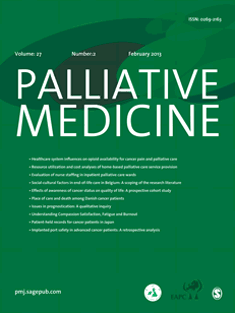
PALLIATIVE MEDICINE
Scope & Guideline
Exploring New Horizons in Pain Management
Introduction
Aims and Scopes
- Comprehensive Palliative Care Research:
Palliative Medicine publishes studies that explore various aspects of palliative care, including symptom management, psychosocial support, and the integration of palliative care into broader healthcare systems. - Interdisciplinary Approaches:
The journal promotes interdisciplinary research, drawing from fields such as psychology, social work, nursing, and medicine to develop holistic approaches to palliative care. - Patient and Family Perspectives:
Emphasizing the importance of patient and family voices, the journal includes studies that analyze experiences, preferences, and outcomes from the viewpoints of those directly affected by serious illness. - Innovative Care Models:
Palliative Medicine highlights research on innovative care delivery models, such as community-based palliative care and telehealth interventions, aiming to improve accessibility and quality of care. - Cultural Competence and Equity:
The journal addresses disparities in palliative care access and outcomes, focusing on culturally sensitive practices and policies to ensure equitable care for diverse populations.
Trending and Emerging
- Telehealth and Digital Interventions:
There is a significant increase in studies focusing on telehealth and digital solutions for delivering palliative care, especially in response to the COVID-19 pandemic, which has transformed how care is accessed. - Palliative Care in Diverse Populations:
Emerging research emphasizes the importance of understanding palliative care needs in diverse populations, including ethnic minorities and LGBTQ+ communities, addressing health disparities and cultural competence. - Integration of Palliative Care into Primary Care:
The trend towards integrating palliative care into primary healthcare settings is gaining momentum, with research exploring collaborative models that enhance access and continuity of care. - Mental Health and Psychosocial Support:
An increasing focus on the psychological and emotional aspects of palliative care is evident, highlighting the need for comprehensive support services for patients and their families. - Research on Family Caregiver Needs:
There is a growing body of literature dedicated to understanding the experiences and needs of family caregivers, emphasizing their role in the palliative care process.
Declining or Waning
- Traditional Biomedical Approaches:
There has been a noticeable decrease in studies focusing solely on traditional biomedical models of care, as the field increasingly embraces holistic and patient-centered approaches. - Single-Disease Focus Studies:
Research that concentrates exclusively on single disease models (e.g., cancer-only studies) is waning, with a growing interest in multimorbidity and the complexities of palliative care across different conditions. - In-Person Palliative Care Models:
As telehealth and remote care delivery gain traction, traditional in-person palliative care models may be receiving less attention, reflecting a shift in how care is conceptualized and delivered.
Similar Journals

Journal of Hospice & Palliative Nursing
Empowering Care, Enhancing Lives.The Journal of Hospice & Palliative Nursing (ISSN: 1522-2179, E-ISSN: 1539-0705), published by Lippincott Williams & Wilkins, stands as a leading resource in the field of hospice and palliative care nursing. With an impressive impact factor and ranked in the Q1 quartile for Advanced and Specialized Nursing and Q2 quartile for Community and Home Care as of 2023, this journal serves as a critical platform for disseminating evidence-based practices and innovative research. It covers a broad spectrum of topics, aiming to improve patient experiences and enhance the quality of care for individuals with life-limiting conditions. Created to support healthcare professionals, researchers, and students in the United States and beyond, the journal invites contributions that stimulate scholarly dialogue and advance the practice of palliative nursing. With publication years converging from 1999 to 2024, it remains an invaluable asset to the nursing community, fostering advancements in this vital area of healthcare.

SUPPORTIVE CARE IN CANCER
Elevating patient support through rigorous scholarship.SUPPORTIVE CARE IN CANCER is a premier academic journal published by Springer, dedicated to advancing the understanding and management of supportive care for cancer patients. With a notable impact factor, the journal is recognized for its contribution to the fields of Oncology, Rehabilitation, and Nursing, achieving impressive rankings in Scopus, including Q1 for Oncology Nursing and Rehabilitation, and Q2 for general Oncology. Founded in 1993 and looking towards a promising future until 2024, it serves as a vital resource for researchers, professionals, and students engaged in these critical areas of healthcare. Although not an Open Access journal, its rigorous peer-reviewed articles provide valuable insights into innovative practices and evidence-based strategies that enhance patient quality of life during and after treatment. By bridging the gap between research and clinical practice, SUPPORTIVE CARE IN CANCER significantly influences patient outcomes and fosters interdisciplinary collaboration in patient support.
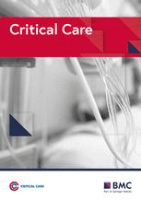
CRITICAL CARE
Connecting researchers for impactful healthcare solutions.CRITICAL CARE is an esteemed peer-reviewed journal dedicated to advancing the field of critical care and intensive medicine, published by BMC. Since its inception in 1998, it has been a prominent open-access platform that allows for the dissemination of high-quality research, fostering collaboration among researchers, healthcare professionals, and students globally. With a notable impact factor and ranking in the top quartile (Q1) of critical care and intensive care medicine, CRITICAL CARE occupies a vital role in disseminating cutting-edge findings and innovative practices that can significantly enhance patient outcomes in critical care settings. The journal not only encourages submissions of original research, clinical trials, and reviews but also emphasizes the importance of interdisciplinary approaches to critical care management. Positioned in the United Kingdom, CRITICAL CARE's commitment to open access ensures that its valuable content is readily available to a worldwide audience, reflecting its mission to bridge knowledge gaps and empower professionals in the pursuit of excellence in critical healthcare.
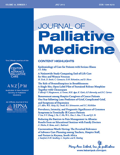
JOURNAL OF PALLIATIVE MEDICINE
Advancing compassionate care for serious illnesses.Welcome to the Journal of Palliative Medicine, a distinguished peer-reviewed publication dedicated to advancing the field of palliative care. Published by Mary Ann Liebert, Inc., this journal serves as a vital resource for researchers, healthcare professionals, and students in the disciplines of anesthesiology, nursing, and general medicine. With an impressive track record since its inception in 1998, the journal has achieved Q1 status in both Anesthesiology and Pain Medicine, as well as in Nursing (Miscellaneous), reflecting its scholarly impact within the academic community. The impact factor and rank underscore its significance, with the journal positioned at the 75th percentile in General Nursing and the 65th percentile in Anesthesiology and Pain Medicine according to Scopus rankings. Though the journal follows a subscription model, it remains committed to disseminating critical research that improves patient care and quality of life for those facing serious illnesses. As the field continues to evolve, the Journal of Palliative Medicine remains a cornerstone for fostering innovation and education in palliative practices, underscoring the importance of compassionate care.
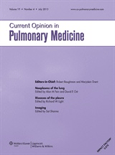
CURRENT OPINION IN PULMONARY MEDICINE
Advancing Knowledge in Pulmonary HealthCurrent Opinion in Pulmonary Medicine, published by Lippincott Williams & Wilkins, is a vital resource for professionals in the field of pulmonary and respiratory medicine. With a robust ISSN of 1070-5287 and an E-ISSN of 1531-6971, this journal has been converging insightful research and expert opinions since 1995. It currently holds a respectable Q2 category ranking in the 2023 Scopus rankings for pulmonary and respiratory medicine, placing it within the 74th percentile of its field. The journal provides an excellent platform for clinicians, researchers, and students to keep abreast of the latest developments, trends, and therapeutic advances, ensuring that it remains an essential component of ongoing education and scholarship in respiratory health. While not open access, the journal offers various subscription options to facilitate access to cutting-edge pulmonary research. Located in Philadelphia, Pennsylvania, Current Opinion in Pulmonary Medicine continues to shape the future of respiratory medicine through its commitment to high-quality content and academic excellence.
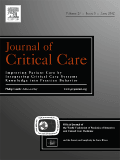
JOURNAL OF CRITICAL CARE
Shaping the Future of Intensive Care Through ScholarshipJOURNAL OF CRITICAL CARE, published by W B SAUNDERS CO-ELSEVIER INC, is a prestigious peer-reviewed journal in the field of critical care and intensive care medicine. With an impressive Q1 classification in 2023, it stands as a leading publication among its peers, ranking #12 out of 110 in the Scopus database, which places it in the 89th percentile of critical care-related journals. Established in 1986 and with a converged timeline extending to 2025, the journal serves as a critical resource for international researchers, healthcare professionals, and students dedicated to advancing practices and understanding within the realm of critical care. Although it does not offer Open Access, the journal provides high-quality, rigorously reviewed articles that address contemporary issues, innovative techniques, and groundbreaking research in critical care medicine. By fostering scholarly dialogue and disseminating new knowledge, the JOURNAL OF CRITICAL CARE is pivotal in shaping the future of intensive patient care and enhancing health outcomes.

Palliative Care & Social Practice
Advancing compassionate care through interdisciplinary insights.Palliative Care & Social Practice is a leading academic journal published by SAGE Publications Inc, dedicated to advancing the field of palliative care and related social practices. Since its transition to Open Access in 2019, the journal has been committed to disseminating high-quality research and practical insights that inform practitioners, policy-makers, and scholars alike. Based in the United Kingdom, the journal boasts an impressive categorization of Q1 in Advanced and Specialized Nursing for 2023, reflecting its influential status in the field. With a Scopus ranking of 15/63 in Advanced and Specialized Nursing and 182/636 in General Medicine, it is recognized as a vital resource for those engaged in the compassionate care of patients and the complexities of their psychosocial needs. The journal’s scope encourages interdisciplinary dialogue and is essential for anyone striving to enhance the quality of life through effective palliative care practices.
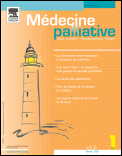
Medecine Palliative
Navigating the Complexities of Pain and Palliative Care.Medecine Palliative is a distinguished journal published by Elsevier, dedicated to the vital field of palliative care and pain management. With an ISSN of 1636-6522 and E-ISSN 2213-0098, this international journal has been an essential resource since its inception in 1970, currently covering research from 2004 to 2024. The journal reflects a commitment to enhancing the quality of life for patients facing serious illnesses, addressing critical issues in Anesthesiology and Oncology, while fostering innovative nursing practices in palliative care. While the journal holds a Q3 ranking in Anesthesiology and Pain Medicine and a Q4 in Oncology categories, making it a valuable venue for researchers and practitioners aiming to contribute to the evolving landscape of palliative medicine. Despite its lower rank in some categories, the journal serves as an important platform for insights, clinical findings, and current practices that can significantly impact patient care. Medecine Palliative is accessible to researchers, professionals, and students who are eager to explore the latest advancements and evidence-based approaches in end-of-life care.

THERAPEUTISCHE UMSCHAU
Empowering Researchers with Insightful Discourse.THERAPEUTISCHE UMSCHAU, published by HOGREFE AG in Switzerland, serves as a vital resource for researchers and professionals in the field of medicine. With an ISSN of 0040-5930 and E-ISSN 1664-2864, this journal has been a credible platform for scientific discourse since its inception in 1947. It is currently ranked in the Q4 category in Medicine (miscellaneous) and holds a position of #462 out of 636 in the Scopus rankings for General Medicine, placing it in the 27th percentile. Although it does not offer open access, the journal presents a wealth of articles that cover diverse therapeutic methods and advancements, catering to a broad audience from seasoned practitioners to emerging scholars. As it converges towards the year 2024, THERAPEUTISCHE UMSCHAU continues to emphasize the importance of innovative research in clinical efficacy and healthcare practices, reflecting its ongoing commitment to advancing medical knowledge and patient care.
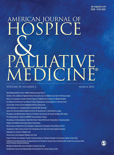
American Journal of Hospice & Palliative Medicine
Transforming the landscape of hospice care through evidence-based research.The American Journal of Hospice & Palliative Medicine, published by SAGE Publications Inc, is a leading peer-reviewed journal dedicated to advancing the field of hospice and palliative medicine. With its ISSN 1049-9091 and E-ISSN 1938-2715, the journal has been a vital resource since its inception in 1984, aiming to provide comprehensive insights into clinical practices, innovations, and research findings that enrich the quality of life for patients with serious illnesses. It holds a prestigious position as a Q2 journal in the field of medicine (miscellaneous), ranked #139 out of 636 in General Medicine with an impressive 78th percentile standing according to Scopus. The journal does not currently operate under an Open Access model, ensuring rigorous review and quality control of its content. Researchers, clinicians, and students are encouraged to engage with the latest developments and evidence-based practices in palliative care as the journal continues to shape discussions and policies in this critical area of healthcare.